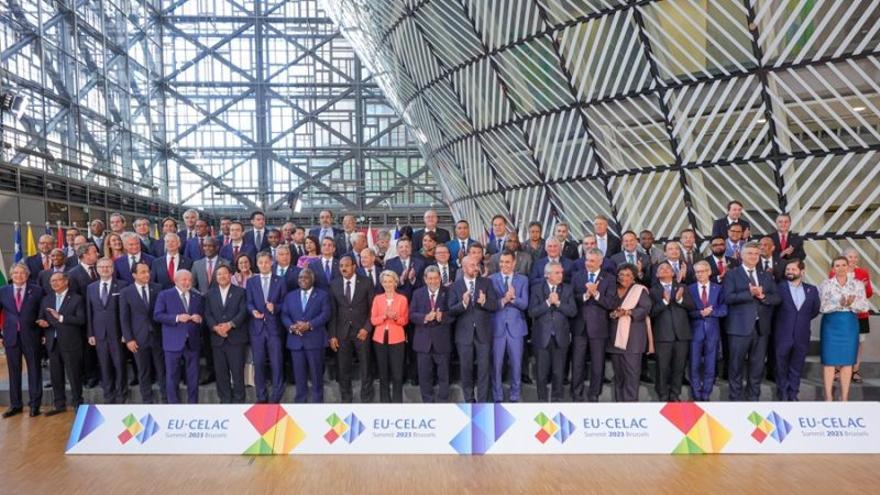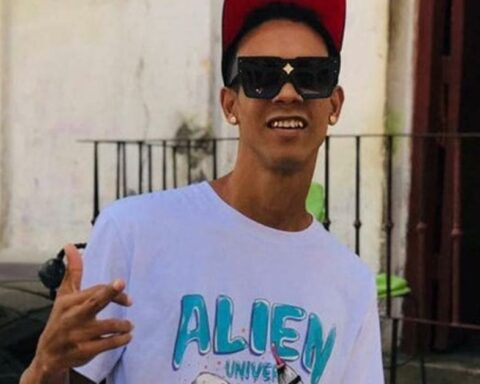The summit between the European Union and the countries of the Community of Latin American and Caribbean States (Celac) that took place this monday and tuesday in Brussels you will not have achieved any objective if you do not condemn the human rights situation in Cuba, Nicaragua and Venezuela or the support of these countries for Russia in the war against Ukraine.
This is what representatives of the conservative and liberal parties – European People’s Party (EPP), Renew Europe (RE) and European Conservatives and Reformists (CRE) – came to say at a press conference on Tuesday from Brussels, attended by the Cuban activists Rosa María Payá, from Cuba Decide, and Erik Cartelle, from the Foundation for Human Rights in Cuba.
Thus, Antonio López-Istúriz, from the PPE, who expressed his concern that in the summit resolution, scheduled for this Tuesday, “at least” human rights on the island, as well as in Nicaragua and Venezuela, are not mentioned. .
“I hope that the European Council has the courage to include these issues”, wished the MEP, who does not conceive that “we fill our mouths talking about human rights for the world, which is one of the mandates we have” and not mention to “three world-renowned dictatorships”. Otherwise, for López-Istúriz, “it would not be a successful summit.”
“This time he has come with another type of suitcase, simply to be present”, ironized the MEP
Regarding the presence of the executive vice president of Venezuela, Delcy Rodríguez, sanctioned by the EU and whom the president of the Spanish Government, Pedro Sánchez, warmly greeted, the popular MEP asserted that “he takes advantage of his diplomatic status.” Likewise, he said that people are “confused” by the presence of these dictators and the lack of forcefulness towards them on the part of Brussels. “What happens, that you don’t have the same attitude towards them as towards others because [estos dictadores] Are they from the left?”
José Ramón Bauzá (RE) expressed himself in similar terms, who mentioned the 40 “suitcases” of Delcy Rodríguez, referring to to the controversial and mysterious meeting between the Venezuelan vice president and the then Spanish Minister of Transport, José Luis Ábalos, at the Barajas airport in Madrid, in January 2020. “This time he has come with another type of suitcase, simply to be present,” ironized the MEP .
Bauzá asserted that “there is no difference between Russia, Cuba, Venezuela or Nicaragua, they are dictatorial regimes,” and recalled the resolution issued by the European Parliament on July 12 that demanded from the Council of the European Union (the main decision-making body of the EU) a condemnation of the repression on the Island, the immediate release of political prisoners and sanctions against Díaz-Canel and other Cuban officials.
As for Ukraine, Bauzá recalled: “The presence of Volodímir Zelenski has been vetoed here, the one who is making a border between the dictators and the freedom that the European Union represents.” And López-Istúriz wished that “the same firmness that they have shown all these months demanding their commitment to Ukraine from friendly countries” would also be manifested with Celac “and be reflected in the final document.” Otherwise, said the first, “it will be a failed summit.”
“There is nothing Europe can do through appeasement,” he continued, because “dictatorships only understand pressure.”
The Cuban activist Rosa María Payá was blunt: “The Cuban regime is the gateway to Russia and China and is an ally of Putin in the war of aggression against Ukraine.” For this reason, she believes, “allowing dictatorships to become intermediaries with the EU places the continent at a disadvantage.” “There is nothing Europe can do through appeasement,” she continued, because “dictatorships only understand pressure.”
For this reason, it encourages the Council to “promote and support each of the recommendations that this Parliament has given in its resolution”.
The participants in the press conference also had words for the recent condemnation of the Inter-American Commission on Human Rights (IACHR) when determining that the Cuban State was responsible for the death of Oswaldo Payá and Harold Cepero. “We hope that this verdict is also recognized internationally,” López-Istúriz stated.
Polish MEP Anna Fotyga, from the European Conservatives and Reformists, recalled that her country, subjugated to the Soviet Union for decades, has experience in “political assassinations”, which authoritarianism passes off as “natural or accidental” deaths to “separate the attention of public opinion”.
Similarly, they referred to the more than a thousand political prisoners on the island and the “heroes” who took to the streets on July 11, 2021. Among them, Bauzá mentioned José Daniel Ferrer and criticized that while Díaz-Canel the leader of the Patriotic Union of Cuba is put under torture in a jail in Santiago de Cuba: “Today the whole world knows where Miguel Díaz-Canel is, but nobody knows where José Daniel is.”
The centrist MEP regretted that no progress has been made since the signing of the EU-Cuba Political Dialogue and Cooperation Agreement, in 2016, and calls for “article 85 to be activated in order to hold the dictatorship accountable.”
________________________
Collaborate with our work:
The team of 14ymedio He is committed to doing serious journalism that reflects the reality of deep Cuba. Thank you for accompanying us on this long road. We invite you to continue supporting us, but this time becoming a member of our newspaper. Together we can continue transforming journalism in Cuba.







